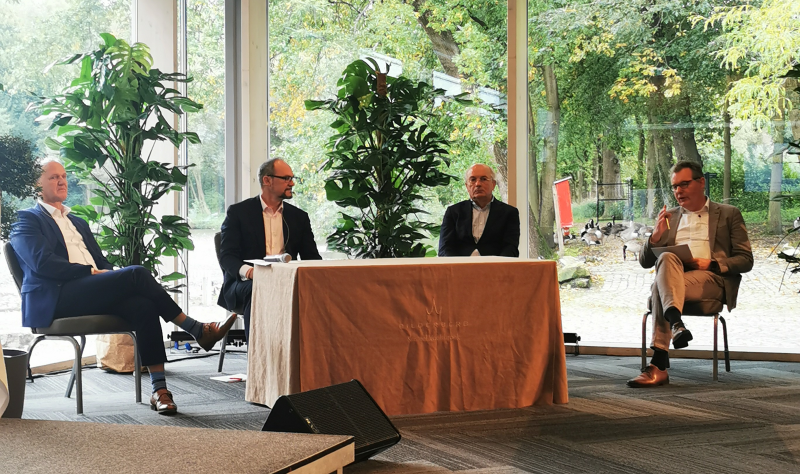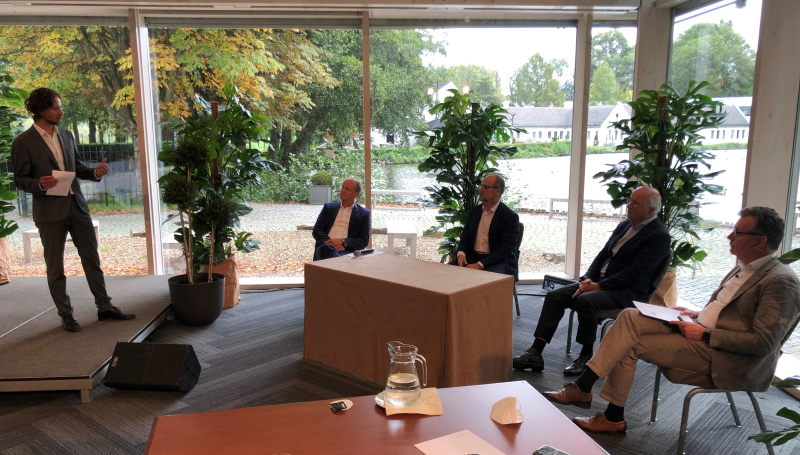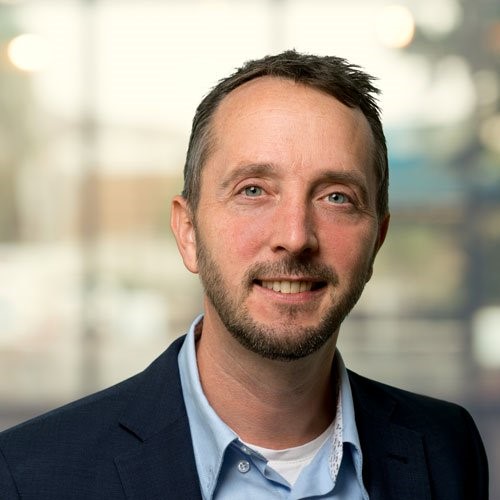Germany and The Netherlands come up with a bilateral agenda on hydrogen and green electrons for industry
In a bilateral virtual workshop between Germany and The Netherlands, hundred invited experts from industry, knowledge institutes, regions and governments discussed ideas for a bilateral agenda on hydrogen and green electrons for a future sustainable industry. The workshop was organized by the Dutch national committee for Electrochemical Conversion and Materials (ECCM) together with her German counterpart.

Martijn de Graaff of TNO, one of the secretaries of this independent platform, stresses the importance of bilateral collaboration on this topic: “We can learn a lot from each other, in research, value chain integration and market implementation as well. Both countries have large ambitions, so let’s align our research and pilot programmes and work even closer together than we already do”. The bilateral agenda will be presented in November to the German and Dutch governments.
“Both in Germany and the Netherlands the innovation climate is in favour of strongly supporting the development of climate-friendly technologies”, explains co-organiser and chair of the Dutch governmental advisory committee on electrochemical conversion & materials (ECCM), Richard van de Sanden. “This provides an important mutual interest and starting point for a bilateral programme to enhance future collaborations in the field of electrification of industry.”
Bilateral agenda
The workshop, organised in close collaboration with the German and Dutch ministries for economic affairs and education and research (BMWi, BMBF, EZK and OCW) and Roland Berger offices, addressed national visions and ambitions, global and bilateral developments in the energy transition and working sessions on cross-border collaboration.

“We want to work towards a bilateral agenda, as a solid base for intensifying cross-border collaboration on national level”, adds Thomas Goergen, head of alliance management at Covestro. “Such an agenda should pinpoint where the interesting leads are, specifically in a bilateral setting.”
Goergen continues: “Moreover, such bilateral collaboration can also be regarded as the ramp up phase towards strong multilateral alliances in European partnerships.” In the online expert meeting, broadcasted from Vaals in The Netherlands, parallel working sessions were organised in the field of materials & catalysis, electro synthesis, electrolysis, system integration & design and engineering & manufacturing of cell equipment.
Upscaling collaboration
The reasons to intensify bilateral collaboration on hydrogen and electrochemical conversion processes in industry are numerous. Marco Waas, Vice President and Director RD&I and Technology at Nouryon, explains: “In 2019, the Netherlands was Germany's second most important trading partner within the EU after France and the fourth most important worldwide. The bilateral trade volume was around 189 billion euros in 2018. Germany is one of the Netherlands' most important trading partners.”
According to Waas, beside these obvious and impressive economic figures, maybe the most important drivers are the unique ecosystems in both countries for innovation. “Germany has unique infrastructure and several boosting national initiatives like the excellence clusters, Kopernikus projects, living labs and energy research networks.”
Wessling, who held a professorship at the University of Twente in the past and knows the Dutch ecosystem very well: “In the Netherlands interdisciplinary and cross-sectoral collaboration is embedded in the mentality I would say. As a relative small country with an open economy, they realise innovate technology as an important export product.”
So far Wessling is very positive about the opportunity to really build a bilateral programme. Wessling: “It is interesting to note that both national governments are interested to interlink the chemical, energy and high-tech manufacturing industry and top-tier science in view of the challenges we need to address.”
Smart sector integration is also a key part of the new strategy of the European Commission, as it aims to use all carriers of energy more effectively, by linking different sectors.
From agenda to programme
Van de Sanden is excited about the follow-up: “During the expert meeting we have been able to collect and align ideas. I saw many obvious partnerships arising during conversation. This confirms my observations when I visited German institutes and companies last year as part of an innovation mission to Germany in the field of the energy transition.”
Van de Sanden is confident that with the support of national governments it should be possible to achieve a bilateral programme. Van de Sanden: “The societal challenge, the companies and the science don’t stop at the border.”
At the end of the workshop in Vaals Van de Sanden was privileged to announce a 3.5 million euro German-Dutch fund for collaboration in the field of electrochemical conversion and materials. This fund, provided by the Dutch government, provides seed capital to further support in networking and exchange of expertise and to align the first bilateral partnerships, anticipating for a bilateral programme by next year.
The workshop took place online and was broadcasted from a studio in Castle Vaalsbroek (NL). The workshop was opened by Dr. Winfried Horstmann ( Director General for Industrial Policy at the Ministry of Economic Affairs and Energy – BMWi), Dr Stefan Kaufmann, member of the German Bundestag and Innovationsbeauftragter Grüner Wasserstoff for the Federal Ministry of Education and Research (BMBF), drs. Focco Vijselaar (Director General for Enterprise and Innovation at the Ministry of Economic Affairs and Climate Policy) and Prof. Emmo Meijer (Chair Topsector Chemistry, on behalf of Topsectors Energy, High Tech Systems & Materials and Chemistry).
